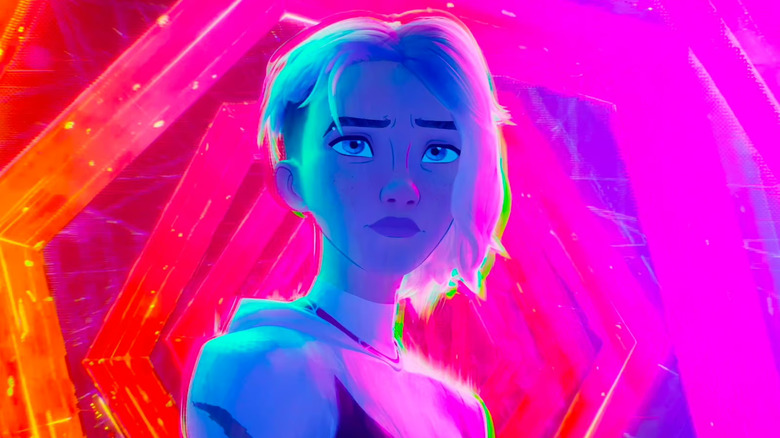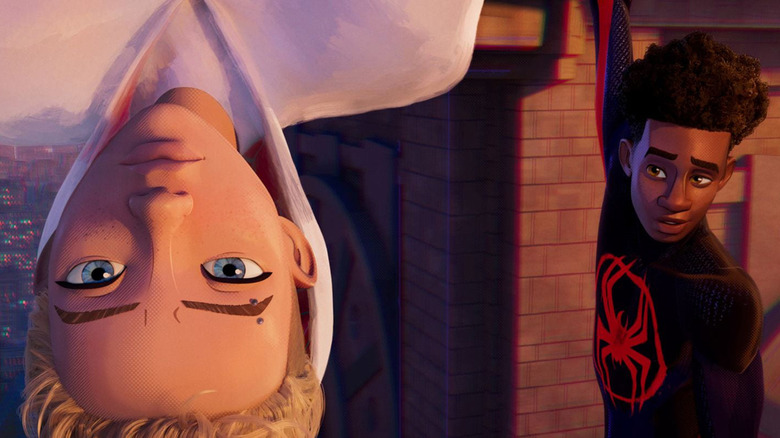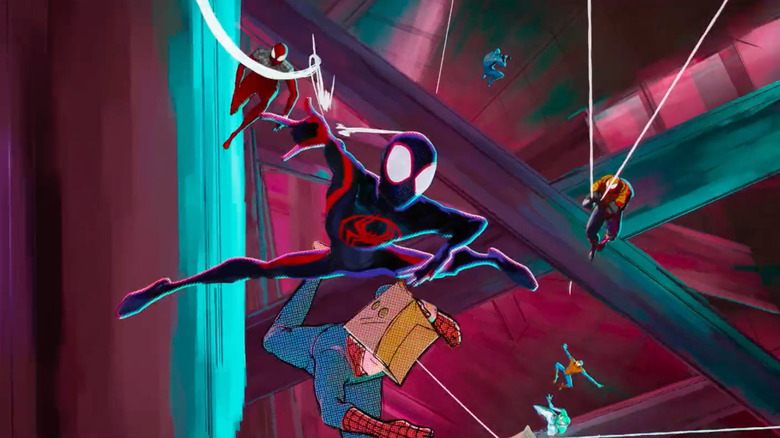Spider-Man: Across The Spider-Verse Filmmakers Say AI Is Not The Future Of Animation
In early November 2023, DreamWorks founder Jeffrey Katzenberg made headlines when he claimed that generative artificial intelligence could cut the cost of animated films by "90 percent." It's a bold claim coming from the man whose recent success stories include being behind the "groundbreaking" streaming service Quibi, which lasted a whopping seven months and cost a reported $1.75 billion, but one that should worry creatives everywhere. It certainly doesn't help when we have filmmakers like Joe Russo claiming AI to be "the future of storytelling."
Disney has already been busted for creating digital replicas of background extras without compensation, and voiceover artists are already seeing roles replaced with AI. AI is a legitimate problem and threat to the industry, not because it can legitimately replace human beings in creative fields but because plenty of people in positions of power (and therefore control the checkbook) believe it can. And it'll take years and untold amounts of money until those folks realize what the rest of us already know to be true.
I attended a press conference today featuring Christopher Miller and Phil Lord in honor of "Spider-Man: Across the Spider-Verse," and the topic of AI came up in regard to the future of animation. Lord and Miller have seen firsthand the way the animation industry has evolved over the last 20 years, and are refusing to treat AI as the second-coming. "I think my hope is that you know, in so much that AI gets used, it's used as a tool to simplify some drudgery," said Miller. "It doesn't have the ability to innovate." Miller called artificial intelligence "a copying machine," rightfully pointing out, "It's an imitator, not an innovator."
AI can't replicate human touch
There are so many small moments of humanity littered throughout the animated projects of Lord and Miller, moments that AI could never dream of replicating. I think about the way Katie Mitchell's eyebrows arch upward when she's nervous in "The Mitchells vs. the Machines" or the way Gwen leans her head forward so her hair falls in front of her face when she's upset in the "Spider-Verse" films, and who can forget the "Clone High" shrug?
"At the end of the day, what really matters in these scenes when we're working on them, is these little observations about the ticks of how a person will, like, pick at their pants or give a little glance to the side," said Miller. "These are things that AI isn't going to do — the kinds of observations that you're gonna need." Miller continued by stressing that his hope and belief is that the industry will continue to realize that human animators, renderers, compositors, and everyone else who helps bring an animated work to life are essential in making a film that audiences want to see.
"The computer does not intrinsically add value to a project, and when an audience goes to the movies to see a movie like ours or a movie like 'Oppenheimer' or 'Barbie,' they're going to see the singular point of view of that film and that collection of filmmakers," said Phil Lord. "So something that's automated is simply not something that audiences value, they value the artistry, they value the handmade quality of something." And he's right. Every day our social media feeds are littered with some garbage prompt like "What if Wes Anderson made 'Mad Max: Fury Road?'" with a lifeless, uninspired visual interpretation. There's now even a (seriously cursed) AI singer named "Anna Indiana" who appears to already be imitating signs of depression following the backlash to her existence.
AI should be treated as nothing more than a tool
Both Lord and Miller acknowledged the tremendous technological advancements made by folks like Sony Pictures Imageworks to bring films like "Spider-Man: Across the Spider-Verse" alive, but as Lord clarified, "They are creating tools so that the distance between the artists who make the film and the audiences who watch it is as shallow as possible — so that you really see the work of the individual artist making each shot or animating each movement that you see as present as possible." A film like "Spider-Verse" simply cannot exist without humans at the helm. There are multiple different styles at play and with a character like Spider-Punk, different parts of his design move at different frame rates. Simply put, AI could never.
Lord referenced Disney's "101 Dalmatians," a film released in the 1960s that brought an evolutionary step in animation by incorporating a Xerox machine in the manufacturing of animation, which allowed the hand drawings of animators to be applied more directly on the screen (and prevent artists from having to draw countless Dalmatian spots on running puppies for an entire movie). It is, in this writer's opinion, one of the most important Disney animated features ever made for that very reason, and the little scratches from reusing the cells only add to the charm in the way we romanticize cigarette burns on film. None of that is possible if we replace animators with AI, as that innovation is not something a computer could "generate" the idea to even attempt. The future of animation is not AI — it's giving artists the tools and resources they need to thrive.
Next step? VFX unionization!


